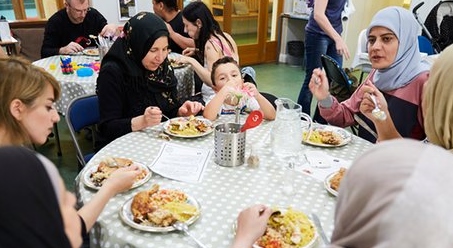 From the Guardian, 10.10.16
From the Guardian, 10.10.16
In a cafe kitchen, a young woman arranges pieces of chicken on a bed of rice and stirs yoghurt into a salad of tomatoes, chickpeas and garlic. Her mother takes a tray of rich, oily aubergine slices from the oven. They are rustling up their version of the Middle Eastern dish maklouba.
This is one of a growing number of volunteer-run cafes across the UK using food that would otherwise be thrown away to create nutritious meals for people who are hungry, lonely or marginalised. It's called The Real Junk Food Project.
But the remarkable difference at All Hallows, an Anglican church in Leeds, is that the food is being cooked by recently arrived Syrian Muslim refugees, many of whom have gone through traumatic experiences but who now want to make a contribution in their new and unfamiliar home.
Salam al-Khatib, 22, who practises saying the word garlic as she crushes cloves, has been in the UK for two months following four years in Lebanon after her family left their home in Homs in 2011. She c ame to Leeds with her parents, two brothers and a sister under the UK’s resettlement programme.
ame to Leeds with her parents, two brothers and a sister under the UK’s resettlement programme.
“Everyone has welcomed us here, everyone has been very friendly. My mum and I volunteered to cook at the cafe. I loved the idea of sharing our food with others.”
Over the course of several hours, some 60 people are fed the Khatibs’ signature dishes. Dashing between the tables to refill water jugs and clear plates is the Revd Heston Groenewald, vicar of All Hallows.
The church has run The Real Junk Food Project – where people pay what they can, or in kind by washing up or weeding the garden – for the past two years, building up from one day a week to four or five. The idea to hand over the kitchen to Syrian refugees one day a week came out of discussions with members of the local mosque.
“All Hallows is a very inclusive, open church,” says Groenewald, who says he thinks the government response to the refugee crisis has been inadequate.“We should have a mindset of generosity rather than austerity. If only we could think in terms of brothers and sisters, of friendships which sprout and flourish, rather than foreigners.”
Alaa Abdul Jaleel, 28, came to All Hallows by accident. “I was looking for a conversation club [to help learn English], but my feet brought me here,” she says. She and her husband fled Deraa in southern Syria where they were both surgeons. They cannot practise in the UK until they have passed three exams. “We get benefits, but we want to work. I’ve met five other Syrian families here who are all frustrated because we can’t work,” she says.
Back in the kitchen, Muslim and Christian volunteers are working side by side. The cafe receives halal chicken from the Nando’s restaurant chain, dried herbs and spices abandoned at the end of term by Leeds University halls of residence occupants, and groceries and vegetables from supermarkets. Only aubergines, tomatoes and lemons had to be purchased for the Khatibs to create their Syrian lunch.
Groenewald has been awarded a grant from the Church of England’s Near Neighbours programme to pay for extras and to ensure the cafe has a secure future. “This feels like a good, effective way to love our neighbours,” he says.
Harriet Sherwood